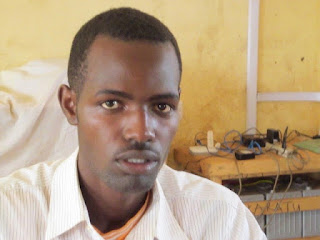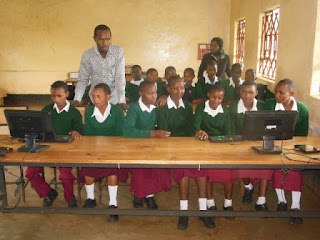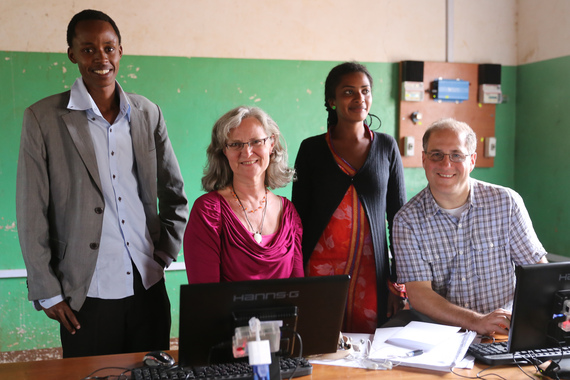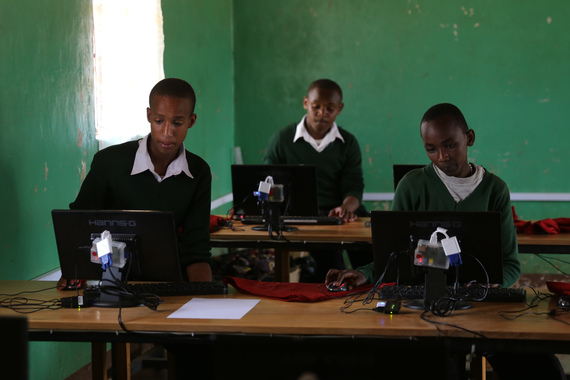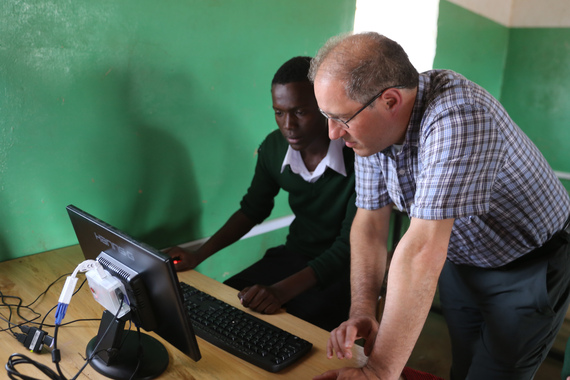"Jina langu ni Janice. Mimi ni mwalimu. Ninafundisha elimu ya kompyuta."
"My name is Janice. I am a teacher. I teach classes of computers."
 |
| Janice captivates the audience |
And so Janice Lathen began the story of Powering Potential, beginning with the same Swahili greeting that started the whole journey. Words are important to Janice. She chooses them carefully. She had 30 minutes to speak of Powering Potential to an audience of 300 executives at the Defrag Conference, considered the "gold standard" of technology conferences, held on November 11 and 12 in Colorado.
Flanked by giant video screens on stage, Janice described a small rural school, less than a year old, where electricity was a some-day promise. She was on vacation in Tanzania, and her traveling group visited a local school. Each person greeted the children; Janice spoke in Swahili. Respect to different countries is important. The students appreciated the respect.
Even from Broomfield, Colorado, the audience could see the broad smiles that Janice described after she spoke in the native tongue. Twenty minutes on the stage -- computers can measure such things -- the first donation came in from a Defrag participant to Powering Potential. Solar power solved the problem of no electricity and Janice lived up to her promise, delivering that first computer to the first school.
Now there are programs in 13 schools reaching more than 7,000 children. A team of people in Tanzania and in the United States work to spread the word, and do more work. Many are volunteering. The Tanzanian government, in particular the Ministry of Education and Prime Minister's Office, are involved; local districts choose the schools. Cross-country participation is a key to the success of Powering Potential. Principles are important. Promises are kept.
 |
| The Defrag Conference is an annual event. |
Defrag is an organization dedicated to exploring technology, its reach and impact on all avenues of society. Entering their 10th year, the conference organizers pride themselves on the level of innovation and collaboration that happens among the attendees. It's a call to action that attracts caring and committed technology innovators, entrepreneurs and designers in the field.
Janice titled her speech "The Joy and Appreciation Variables."
"It was the joy that I felt in speaking Swahili,"" Janice explains. ""My desire to show respect to the Tanzanians by speaking in their own language. They reacted to the greeting with exuberant appreciation. It ignited a spark. The power of that reaction still reverberates ten years later."
Defrag participants sat in the audience, listening intently. Photographs of Halima, Neema and Tumaini appeared on the video screens with big grins. Another spark was ignited.
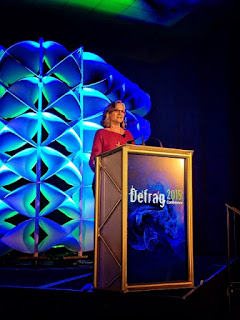 |
| Founding Director Janice Lathen presents at Defrag |
"I heard and watched Janice present to the audience at the Defrag conference," said Larry Hawes, Research Director, Gigaom Research. "I was blown away by her and Powering Potential's work. So was the rest of the audience."
Janice had 30 minutes with the audience and donations kept coming in. The contributions were an unexpected bonus of the presentation, a reminder that this project touches individual lives.
Janice already had much to appreciate from Defrag connections. Another keynote speaker, Lorinda Brandon, had introduced Janice to the convention organizers, Eric and Kim Norlin, which led to her invitation to speak. Her travel expenses were sponsored by Mike Maney, VP Brand & Communications, of Cloud Foundry Foundation. The Norlins covered conference costs. Then came the exciting news that Charlie Wood, Co-founder and CEO at Numerous, would match whatever was raised from Defrag attendees. It was staggering: a total of $8,025 including the matching grant.
"The recognition of Powering Potential and the work we do is so fulfilling," said Janice. "Tanzania is a special place. To see that our work, and the work of our partners in Tanzania, is appreciated just renews our energy to do more."
"We have ambitious goals for the years ahead and plan to have more computer labs up and running as long as people continue to join forces with us to make it happen," she continued. "Our new connections through Defrag -- and the immediacy of their response to Powering Potential -- gives us new energy to keep moving forward."
"Onward and upward!"
o o o
Swahili is the language of Tanzania. Here is another taste of that beautiful language:
Mimi ni Mmarekani.
I am an American.
Mimi ni Mtanzania.
I am a Tanzanian.





